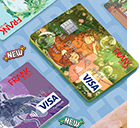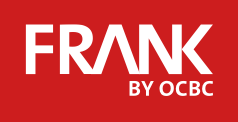Join other trail-blazing young adults in getting monthly career & financial tips, written by those who have succeeded before.
- FOR EXECUTIVES

Learn how you can fast track your money with the OCBC 360 Account and FRANK Credit Card.
OR CHECK OUT RECOMMENDED PRODUCTS
- FOR STUDENTS

Find out how you can be smart about your money with the FRANK Account and Debit Card.
OR CHECK OUT RECOMMENDED PRODUCTS
- PRODUCTS

OCBC 360 ACCOUNT
Learn more
FRANK CREDIT CARD
Learn more
FRANK ACCOUNT
Learn more
FRANK DEBIT CARD
Learn moreEXPLORE OUR PRODUCTS FOR YOU
- DIGITAL


Save, invest and manage your money anytime, anywhere with digital banking.
CHECK OUT OUR DIGITAL SOLUTIONS
- ABOUT FRANK

FRANKPRENEURSHIP
See all internshipsOTHER HELPFUL LINKS
- Login
